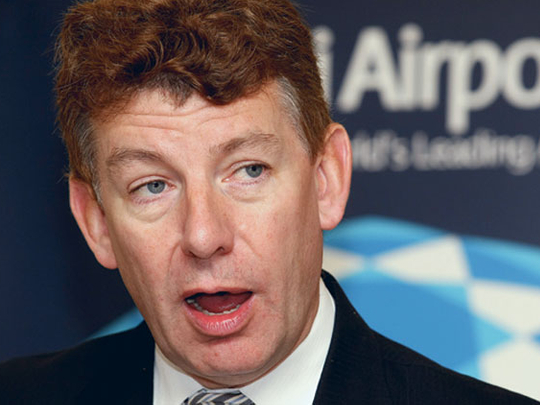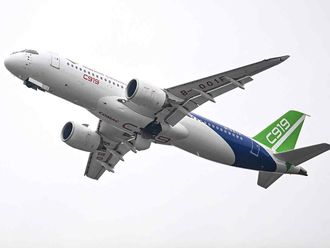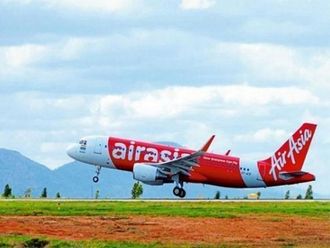
Dubai: The fact that the global aviation industry has just gone through one of its more turbulent phases in recent history sits lightly on Paul Griffiths. As CEO of Dubai Airports, he was pitched into the maelstrom brought on by volcanic ash clouds over Europe in mid-April and the havoc this caused flight services around the world.
As images of the heavy ash-laden clouds interchanged with those of stranded and irate passengers at airport terminals on media platforms, the fallout had its impact on Dubai's aviation space as well.
Yet, as against the more than 100,000 flight cancellations reported worldwide between April 15 and April 21, Dubai's airport saw just over 500.
And in an effort that was to win Dubai — and Dubai International (DXB) — a lot of credit in the following days, most of the 6,000 or so passengers who were stranded in the process were easily accommodated in the many hotels across the city.
As Griffiths sits down for the interview at his plush offices, his demeanour was one of self-assurance, and of having accomplished a challenging task with all-round satisfaction.
GULF NEWS: You have just come out with fairly strong results for April despite the ash clouds and the disruptions this brought on. Cause for a measure of satisfaction or even more?
That we were still able to deliver a double-digit passenger growth, it's a strong statement about confidence in aviation in the region. I think we can be very pleased with the numbers.
Right through the time the crisis lasted, was it an all-hands-on-deck situation?
We are operating in a 24x7 operational environment where you have to expect the unexpected. The reason it worked is we put in a lot of time and effort into putting a number of procedures in place for such an eventuality.
The key reason to success was the fact we had the joint control room, all stakeholders in Dubai's aviation (industry) — airlines, the medical teams, Emirates, Dnata, the police — were all there in the centre.
That became the heart of the crisis management. You are much better at putting the handling of the crisis in the hands of people who would ordinarily be doing that job.
It worked very well from that perspective. It was very good to see the various decisions that were made were co-ordinated through that body of people.
I have nothing but praise for all the stakeholders, how they worked so spectacularly to ensure passenger inconvenience was minimised. In fact, we were mentioned all around the world as being a model in how to handle a customer in those situations.
A lot of airlines and airports got criticised at the way they responded, while we were held up as a measure of how things could be done.
A solid showing in April comes on top of some impressive numbers in the first three months of the year. Enough indication for a good run for the full year?
I think so. The traffic growth we have seen through the first three months is giving us confidence that we are going to achieve our goal for the year. And hopefully, we could even exceed that.
I think this year we were going to grow by 13.6 per cent on the passenger side, and so far for the four months we have grown 18.7 per cent. So if we have a good summer, then we will exceed our growth expectations.
We are regularly carrying significantly more than three million passengers a month. Our 12-month cumulative total is about 42 million, and I think by the end of the year we will be exceeding that.
We are now the third largest scheduled airport in the world for both international passengers and cargo traffic. There's only now Heathrow and Hong Kong on the passenger side and Heathrow and Incheon (South Korea) in cargo.
That's a dramatic statement. When I arrived I think we were number nine. I don't think any airport has jumped six places in that time.
But do you foresee the need to raise airport tariffs at some point in the future?
If your volumes are growing strongly, I don't think there is a case for raising prices. You naturally get an increase in income.
In fact, our strategy for the next few years is not to charge airlines or customers more money for visiting Dubai.
What we want to do is to concentrate on the non-aeronautical side of our income — retail, duty free, [food and beverage] and hotel — to dramatically improve both the quality and range of services we provide. And that way we recover a greater share of revenue.
It's much better to get income from services people want to buy rather than simply charging taxes and fees over which a customer does not have choice.
But is this workable since a lot of the cost elements are increasing?
It's a workable solution because there is a lot of potential when you are operating the third largest airport in the world. The throughputs we are now getting and the growth on that gives a double opportunity.
First of all, the volume increase gives you the revenue increase. The second thing, if you are able to offer a broader range of services, then individuals will want to spend more.
That would be a healthy increase in revenue without having to raise constantly the landing or passenger tax. While we don't actually control the elements of the aeronautical side, our preference is to encourage growth in volumes.
There has been much speculation that the master plan for Dubai World Central - Al Maktoum International (DWC) could be downsized because of the present state of the economy. Has anything been decided on this?
The master plan for aviation in this town has only ever gone one way… and that's upwards. We see every time we revisit the plans or the growth of the sector there's a need to increase capacity.
We never suggested we should scale it back.
When you've got an environment such as Dubai where the whole enterprise relies so much on having a healthy aviation infrastructure of sufficient quality and capacity to be the powerhouse behind the growth of Dubai, you cannot even think of scaling things back.
Then intention then is to stick with what was planned?
Emirates has got some very aggressive growth plans for the next 10 years. Flydubai has skyrocketed to be the second largest carrier here in less than 12 months, and other airlines are growing at capacity.
The whole way people are flocking through Dubai — both as a destination for leisure and for business — and as a first-class transit airport, solidifies our position to continue to invest in infrastructure, both here are and at Dubai World Central.
There is no suggestion now that the idea we will have good times and bad is likely to change. But the cycles at which those good and bad times occur are relatively short compared to the decisions one has to make related to infrastructure development.
Airport infrastructure requires very long-term planning, we are currently planning for the next 20, 30, 40 years. If we were to pause and slow down our infrastructure projects, the very real result is we will run out of capacity.
I don't think that's a very sensible strategy. If there is so much ability for the sector to generate significant amount of revenues from its activities, and that activity continues to grow, there is the cash flow to sustain it.
This is not the time to hesitate, it's the time to just keep going, stick by the plan and continue to deliver that quality and capacity for the next two decades.
With June 27 set as the date for the opening of Al Maktoum International, the whole issue of landing rights will come to fore. This has often been seen as a thorny issue for airlines seeking a higher number of landing rights in Dubai. How do you see it?
It's not a touchy issue at all, it's very, very straightforward. There are two elements to that. One is based on the commission to fly which is the standard arrangement between nations.
Dubai's position is very straightforward. We operate a very liberal open-skies policy. We will allow any carrier to operate in Dubai and in exchange for that expect similar treatment on other routes to other places.
In many cases, that's not fully reciprocated. But as far as Dubai is concerned, we will not deny anyone the ability to come and operate here.
We are not differentiating landing rights between Dubai World Central and Dubai International. So, it's the most liberal air transport environment that exists on the planet today.
The second element of landing rights is capacity-based and that's the ability of an airline to get a slot at a particular time to be able to land or take off. As the airport becomes more and more busy we had to be more rigid about how we schedule and control the allocation of slots.
We now have a co-ordination process that seeks to make best use of capacity. Obviously, you don't want every aircraft turning up at one time, and then be delayed in processing people, delayed in departing, and getting aircraft to stand.
So, are you expecting a long round of negotiations with the airlines closer to June 27?
If the airline has the right to fly to Dubai, it already has the right to operate to either Dubai International or Dubai World Central.
As far as capacity is concerned, when you open the new airport, it's clearly not going to fill all the slots.
We will be open for business on June 27 and there are no restrictions on the capacity and ability of an airline to operate provided they have the traffic rights to do so.
One surprise element in your recent results is the gains made by cargo throughputs. How do you see it?
It's very, very healthy. Cargo is a very good indicator of economic health. It's the first sector of aviation to show when there's been a decrease in trade and the first to pick up when the rebound starts. It's a good indication of the future strength of the economy.
We saw a very small dip in cargo between April and June 2009, and ever since July it's rebounded strongly — December was 25.9 per cent, January 31.5 per cent, February 26.7 per cent, March 21.9 per cent and April 19.7 per cent.
In the four months, cargo has actually grown about 24.6 per cent over the comparable period last year.
We are greatly encouraged to see trade is returning now to Dubai.
How would you list your immediate short-term priorities?
To get DWC on the 27th of June. Contemporaneous to that, to get a (high) quality of service delivered through the summer.
We continually break records and this summer will clearly be the busiest we ever handled.
The priorities would be to deliver quality of service, eliminate any form of congestion through the summer, and continue to respond of the challenges to grow capacity in line with demand.
In fact by the end of the decade we are suggesting that demand for passenger traffic through this airport will be well over 90 million.
It's going to be a challenge getting enough capacity to service that. For the moment we are about 60-million capacity and 42-million demand.
By the time we get to the end of 2012, when the brand new concourse — Concourse 3 — opens, we will be at 75 million. Then we need to find that extra 15 million.
A combination of different assets contributes towards that — runway movements, taxiway congestion we got to relieve, we need more aircraft stands, we need greater terminal capacity, etc.
Will the strategy going forward place more emphasis on Dubai World Central?
Our strategy is to develop both airports, in fact what we do at DWC is to ensure we get the acceleration of the new facilities there to be able to accommodate a move with Emirates.
Clearly, Emirates needs to have a single base. Its entire business model is predicated on having an efficient transfer hub and you cannot split a transfer hub into two. It just doesn't work.
What we have to do is to make sure we deliver enough capacity as quickly as we can at Dubai World Central to enable Emirates to move its entire operations at one go. Now that will not be possible until some time into the next decade.
We are talking of a period of time. In that interim we still have to be investing significant amounts of money in this airport as well as on the new one.
Profile
Path of a Leader
If ever Paul Griffiths considers a switch from aviation, he will not have much trouble honing in on a second career.
Griffiths plays the organ, and as it is he has managed to combine a high-profile career with a schedule of concert and recital engagements. These have included public appearances as a recitalist, continuo player and soloist in concerti with major orchestras.
He started to learn to play the organ as a callow 10 year old and later studied both music and computer science.
Since then, he has been highly placed in national competitions and worked his way through a series of professional qualifications to become a Fellow of the Royal College of Organists. He has since become a council member, chairman of the executive committee and a vice-president of the Royal College.
But in his chosen profession of air transportation, Griffiths has gone many a mile, literally and otherwise.
Prior to moving to Dubai, he was managing director of Gatwick Airport, the second largest airport in the UK. Before joining airport operator BAA in 2004, he spent 14 years with the Virgin Group, and was board director of the Virgin Travel Group.
He joined Dubai Airports as its first CEO in October 2007. Exactly a year later, on October 14, he orchestrated the launch of Terminal 3 at Dubai International.
Now he is also set to usher in a brand new chapter in Dubai's aviation space - the launch of Dubai World Central - Al Maktoum International later this month.











